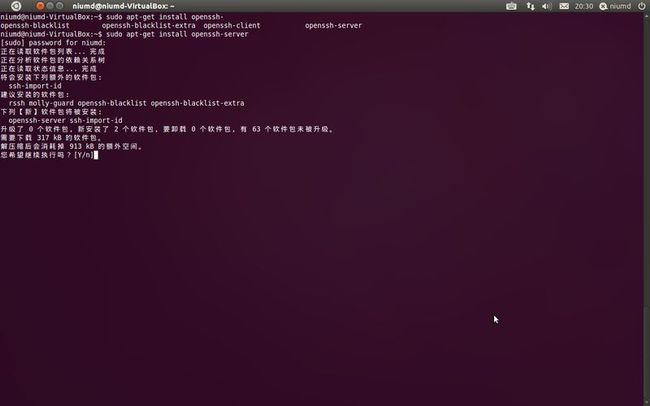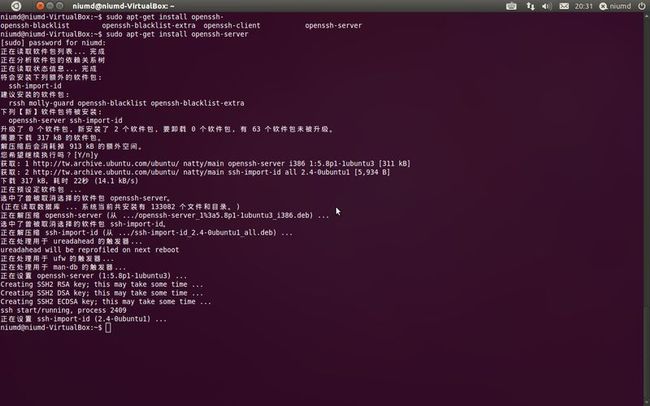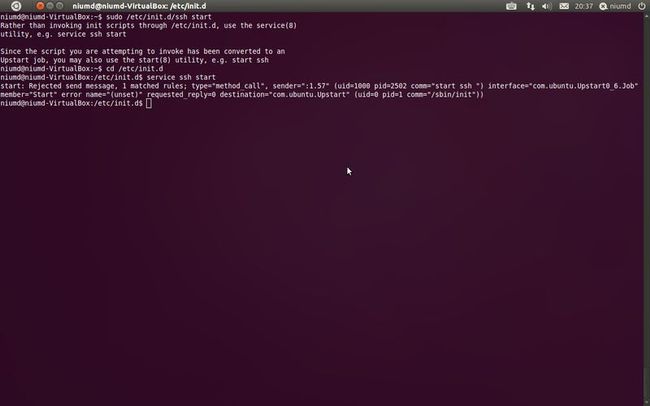- Ubuntu常用命令整理
十里染林
ubuntu16.04server开启ssh:使用x-shell连接主机,发现22端口没有打开,开启ssh服务:安装openssh-serversudoapt-getinstallopenssh-server检查安装是否成功sudops-e|grepssh开启ssh服务sudoservicesshstartUbuntu开启/关闭防火墙:开启防火墙sudoufwenable关闭防火墙sudoufwd
- 处理绿盟科技安全评估的系统漏洞
自我修炼的小石头
数据库运维开发工具
如下图一次扫描,中度风险39个,这个是必须要处理的.其中mysql占了36个,一看这个感觉整个人都不好了.但是最后解决的办法也很简单,就是升级.系统版本Redhat7.31.telnet因为要升级openssh,openssl,为了避免意外,首先要开启telnet服务,并把所有相关的包上传到服务器.1.1确认是否安装了telnet和xinetd(默认是没有安装)rpm-qatelnet*rpm-q
- WingIDE 6.1.5 设置远程调试
汪成心
这其实是参考WingIDE官网的介绍,很多是用谷歌翻译过来的。为远程开发进行SSH设置安装SSH查看SSH服务是不是安装sudops-e|grepssh出现如下界面表示已安装Screenshotfrom2020-02-2915-24-04.png否则使用如下命令安装sudoapt-getinstallopenssh-server生成SSH密钥对在运行WingPro的系统上使用ssh-keygen生
- windows安装openssh
大猫熊猫
openssh
下载setupssh-9.8p1-1.exehttps://www.mls-software.com/opensshd.html安装完成后,会提示密码,记录cmd命令窗口,管理员权限打开#启动服务netstartopensshd#终止服务netstopopensshd用户名就是电脑的用户名
- Gerrit报错:Permission denied (publickey)
阳哥说全栈
Gitgit
在使用Gerritpull代码的时候,你会发现报错,错误信息大概是:Permissiondenied(publickey)。是由于OpenSSH从8.8版本由于安全原因开始弃用了rsa加密的密钥,因为OpenSSH认为rsa破解成本已经低于5万美元,所以觉得成本太小了,有风险就给禁用了。你可以通过命令:ssh-v[git服务器]去查看Gerrit服务器的OpenSSH的版本号,如果≥8.8,就可以
- VulnHub DC-1-DC-7靶机WP
蚁景网络安全
网络安全渗透测试
VulnHubDC系列靶机:https://vulnhub.com/series/dc,199/#VulnHubDC-1nmap开路获取信息Nmapscanreportfor192.168.106.133Hostisup(0.00017slatency).Notshown:997closedportsPORTSTATESERVICE22/tcpopenssh80/tcpopenhttp111/tc
- Ubuntu的ssh
请不要问我是谁
安装sshsudoapt-getupdatesudoapt-getinstallopenssh-server检测ssh是否启动sudops-e|grepssh创建root用户sudopasswdroot配置本机无密码ssh登录cd/home/spark0ssh-keygen-trsa-P""cat.ssh/id_rsa.pub>>.ssh/authorized_keyschmod600.ssh/a
- gitlab+habor+jenkins+k8s 安装流程及配置实现CICD
爱摄影的程序猿
开发工具devopsCICDdevopsjenkinsgitlab
以下是基本的安装流程及配置实现CICD的步骤:安装GitLab:安装依赖项:yuminstallcurlpolicycoreutils-pythonopenssh-server启动和设置SSH:systemctlenablesshd&&systemctlstartsshd安装Postfix:yuminstallpostfix添加GitLab仓库:curlhttps://packages.gitla
- Linux入门-day 1
Start-Hlyr
linux服务器
Samba服务器配置1.安装openssh-server$sudoaptinstallopenssh-server2.检查是否安装samba$dpkg-l|grepsamba3.安装samba$sudoapt-getinstallsamba4.配置samba配置文件位于/etc/samba/smb.conf5.启动并启用samba服务查看samba服务名称$systemctllist-units-
- linux7.6安装telnet服务,CentOS 7.6 Telnet服务搭建过程(Openssh升级之战 第一任务备用运输线搭建)...
Ronald Wang
有不明的问题的时候,都来博客园转转,总能找到答案或者灵感,开博3个月都没发一篇帖(不晓得管理员有何感想,不会封我的号吧),不能只是索取没有付出。小白一枚琢磨了半天才扒拉明白Telnet服务搭建(照葫芦画瓢,也要知道葫芦从哪里来的),去繁就简,简单整理一下,分享一下。Linux上的ssh那么好用为什么还要用Telnet这么老旧的东东呢?最近被SSH暴力枚举漏洞弄得头疼,奈何CentOS7最后版本是7
- telnet yum linux安装,CentOS 7 LINUX下安装telnet服务
WebWarrior
telnetyumlinux安装
在CentOS7下升级了openssl和openssh,顺便装了下telnet服务。#安装telnet避免ssh无法登录yum-yinstallxinetdtelnettelnet-server在telnet情况下root登录提示loginincorrectlinux默认情况下root用户使用telnet是登录不了的,需要修改/etc/secruetty文件#允许root账号登陆vi/etc/se
- github配置ssh密钥连接设置好后仍旧出错
刚刚觉醒的小菜鸡
githubssh运维
前言前段时间配置ssh到GitHub,可是配置后还是用不了拉取什么的操作,后面查阅资料找到原因了,故分享出来查看、开启ssh服务首先先提供下在服务器上查看ssh服务状况的代码查看ssh服务的开启状态ps-e|grepssh若中断出现sshd则表明系统已经安装ssh-server,否则则需要安装sudoapt-getinstallopenssh-server启动ssh服务sudo/etc/init.
- 怎么开启22端口访问权限,让别的机器通过ssh或者向日葵等远程控制工具链接
MonkeyKing.sun
ssh智能路由器网络
在Ubuntu24.04上开启22端口访问权限,并允许其他机器通过SSH或向日葵等远程控制工具进行连接,您需要进行以下几步操作:1.安装并配置SSH服务器安装OpenSSH服务器:sudoaptupdatesudoaptinstallopenssh-server检查SSH服务状态:sudosystemctlstatusssh确保SSH服务正在运行。如果没有运行,可以启动它:sudosystemct
- 在乌班图上安装SSH服务
ChampionDragon
乌班图sshubuntunetstat
更新包列表:sudoaptupdate安装OpenSSH服务器软件包:sudoaptinstallopenssh-server安装完成后,SSH服务将自动启动。您可以通过运行以下命令来检查SSH服务的状态:sudosystemctlstatusssh如果SSH服务没有启动,您可以使用以下命令启动它:sudosystemctlstartssh要使SSH服务在系统启动时自动启动,请使用以下命令:sud
- 《Git/Gitlab进阶》二:omnibus package安裝gitlab-ce
紫狐挽诗
omnibus-package安装gitlab-ceubuntu下安装gitlab-ce官方推荐安装,步骤也非常简单.安装并配置需要的依赖1先更新apt-get:sudoapt-getupdate2再安装openssh-serversudoapt-getinstall-ycurlopenssh-serverca-certificates注意,在ubuntu18安装时openssh-server时,
- CentOS7 ssh登录配置
魔同
Linuxssh运维linux
CentOS7简单ssh登录配置一、基础配置1.查看当前的centos是否安装了openssh-server服务。默认安装openssh-server服务。rpm-qa|grep-E"openssh"显示结果含有以下三个软件,则表示已经安装,否则需要安装缺失的软件openssh-7.4p1-21.el7.x86_64openssh-clients-7.4p1-21.el7.x86_64openss
- 【综合架构】Part 4 SSHD服务
比奇堡小王子
综合架构linux
1openssh特点实现加密的远程连接/数据传输openssh-server服务器(sshd,/etc/sshd_config)openssh-client客户端命令(scp,ssh)2TelnetvsOpenssh共同点区别应用场景openssh服务远程连接数据是加密的默认使用opensshtelnet服务远程连接数据是未加密的升级openssh服务时,启动telnet服务安装Telnet服务步
- 升级ssh8.8报错Key exchange failed. No compatible key exchange method. The server supports these methods:
努力的大黄蜂
运维ssh
因安全需要ssh7.4升级到8.8之后报错同事用的Xshell小蜗牛我用的securtCRT,第一天升级完成之后没有发现问题,第二天来了之后发现连接不了了。。。。。。同事的小蜗牛能接着连,CRT就不行,于是~发现的问题原因:高版本的openssh需要增加对旧版本CRT客户端密钥交换算法的支持解决方法:在配置文件中增加密钥交换算法配置如下(我这里是/usr/etc/sshd_config文件,具体请
- ubuntu16下搭建web服务器以及数据库
AI_Engine
我的公众号:AIEngine(I是大写的i啦!!!)前几日有位关注本人公众号的朋友想咨询下如何0起步搭建web服务器并关联数据库,正巧之前也有人问过类似的问题,今天留下干货一篇,搭建的环境正好也可当做靶机使用。对于大神们可以绕道,不过哪里说的不对欢迎指教啊~首先呢,我们搭建一台ubuntu16.04的虚拟机(方便试验,真实情况当然是要有一台服务器了),然后安装openssh-server(open
- JAVA:FTPClient报错 org.apache.commons.net.MalformedServerReplyException: Could not parse response code
牛奶下面条!
java
报错信息如下:Exceptioninthread"main"org.apache.commons.net.MalformedServerReplyException:Couldnotparseresponsecode.ServerReply:SSH-2.0-OpenSSH_8.0atorg.apache.commons.net.ftp.FTP.getReply(FTP.java:344)atorg
- 在Windows电脑上启动并配置SSH服务
hylreg
windowsssh运维
在Windows电脑上启动并配置SSH服务,可以按照以下步骤进行操作:1.安装OpenSSH服务器Windows10/11(版本1809及更高版本)打开设置:按Win+I打开设置应用。前往“应用”设置:选择“应用”,然后点击“可选功能”。添加功能:在“可选功能”页面,点击“添加功能”。安装OpenSSH服务器:在搜索框中输入“OpenSSHServer”,勾选该选项,然后点击“安装”。Window
- 01 SSH--
SunsPlanter
Gitssh运维
SSH基本概念SSH全称SecureSHell。安全外壳协议(安全的shell),是一个计算机网络协议(默认端口号为22)。通过ssh协议可以在客户端安全(提供身份认证、信息加密)的远程连接Linux服务器或其他设备。Xshell、MobaXterm、OpenSSH软件都提供了基于SSH协议的远程连接。其中,OpenSSH主要用于类Unix系统,在很多Linux系统中,OpenSSH是默认安装和使
- CentOS 7 基于官方源码制作openssh 9.7p1版本rpm包(含ssh-copy-id和显示openssl版本信息)—— 筑梦之路
筑梦之路
linux系统运维centossshlinux
制作过程参考之前的文章,CentOS7基于官方源码和openssl制作openssh9.6rpm包(含ssh-copy-id)——筑梦之路_openssh9.6-CSDN博客几乎没啥差别2023年3月12日,已经制作好的二进制rpm包和src包见我的资源。
- centos开启ssh服务命令
kolaseen
centossshlinux
1.检查centos是否安装了openssh-serveryumlistinstalled|grepopenssh-server如果没有则输入下面的命令进行安装(输入su进入管理员模式)yuminstallopenssh-server2.进入/etc/ssh/目录下的sshd服务配置文件sshd_configvim/etc/ssh/sshd_config按下键盘的o键或i进入编辑模式找到如下行将注
- Linux 制作 OpenSSH RPM 包
dongsong1117
linux运维服务器OpenSSH
文章目录1.安装依赖2.建立编译目录3.下载源码包并解压4.复制编译配置5.修改编译配置6.编译制作RPM包本文适用系统:RockyLinux9、AWSAmazonLinux20231.安装依赖RockyLinux:dnf-yinstallepel-releasegccinitscriptskrb5-develmakeopensslopenssl-develpam-develperlrpm-bui
- CentOS 7升级openssh9.6p1
lakeside1
运维centoslinux运维升级openssh
一、环境情况[root@localhost~]#cat/etc/redhat-releaseCentOSLinuxrelease7.9.2009(Core)[root@localhost~]#ssh-VOpenSSH_7.4p1,OpenSSL1.0.2k-fips26Jan2017二、准备1.开启telnet主要是在安装过程中,需要卸载老版本openssh,临时启用telnet,方便操作。其中还
- Suse 12更新操作系统Openssl(3.2.0)、OpenSSH(9.6p1)及ntp(4.2.8p17)(源码编译安装)
Lz__Heng
服务器linux运维opensshntpsuse
部署前准备安装依赖zypperinstall-ygccgcc-c++glibcmakeautoconfopensslopenssl-develpcre-develpam-develzypperinstall-ypam*zlib*SUSE的pam模块支持与其他Linux不同,请按需检查openssh-9.6p1.tar.gzopenssl-3.2.0.tar.gzzlib-1.3.1.tar.gz(
- FinalShell连接不上LinuxCentOS-7的解决方案
ʚ小华
linuxssh网络
知道虚拟机ip地址并保证输入密码正确时使用FinalShell连接Linux虚拟机时报如下错误:解决方法:1、查看ssh相关服务安装情况,因为有一些虚拟机在最小化安装后并没有安装ssh使用“rpm-qaopenssh*”命令进行查看如若没有,则输入yuminstallopenssh-server命令进行安装,vi/etc/ssh/sshd_config启动ssh服务systemctlstartss
- 【工具类】vscode ssh 远程免密登录开发
knowledgebao
工具类vscodesshide
存放代码的机器运行sshd,使用vscode的机器保证可以通过ssh登录服务器vscode机器通过ssh-keygen生成ssh公私钥对将客户端的id_rsa.pub加入到服务器的鉴权队列catid_rsa.pub>>authorized_keysvscode配置即可.ctrl+p,remote-ssh:opensshconfigurationfile…HostubuntuHostNamexxx.
- 主机安全加固之-openssh版本升级
捞一碗月光-zq
安全
升级openssh之前,为了保证能正常通过工具连接主机,咱们开启telnet服务,通过telnet的方式登录主机一:开启telnet服务1.安装telnet服务[root@localhost~]#yuminstall–ytelnettelnet-serverxinetd2.修改telnet服务配置文件,重启服务centos7.0配置文件为/etc/xinetd.conf,无需修改配合文件中disa
- JAVA基础
灵静志远
位运算加载Date字符串池覆盖
一、类的初始化顺序
1 (静态变量,静态代码块)-->(变量,初始化块)--> 构造器
同一括号里的,根据它们在程序中的顺序来决定。上面所述是同一类中。如果是继承的情况,那就在父类到子类交替初始化。
二、String
1 String a = "abc";
JAVA虚拟机首先在字符串池中查找是否已经存在了值为"abc"的对象,根
- keepalived实现redis主从高可用
bylijinnan
redis
方案说明
两台机器(称为A和B),以统一的VIP对外提供服务
1.正常情况下,A和B都启动,B会把A的数据同步过来(B is slave of A)
2.当A挂了后,VIP漂移到B;B的keepalived 通知redis 执行:slaveof no one,由B提供服务
3.当A起来后,VIP不切换,仍在B上面;而A的keepalived 通知redis 执行slaveof B,开始
- java文件操作大全
0624chenhong
java
最近在博客园看到一篇比较全面的文件操作文章,转过来留着。
http://www.cnblogs.com/zhuocheng/archive/2011/12/12/2285290.html
转自http://blog.sina.com.cn/s/blog_4a9f789a0100ik3p.html
一.获得控制台用户输入的信息
&nbs
- android学习任务
不懂事的小屁孩
工作
任务
完成情况 搞清楚带箭头的pupupwindows和不带的使用 已完成 熟练使用pupupwindows和alertdialog,并搞清楚两者的区别 已完成 熟练使用android的线程handler,并敲示例代码 进行中 了解游戏2048的流程,并完成其代码工作 进行中-差几个actionbar 研究一下android的动画效果,写一个实例 已完成 复习fragem
- zoom.js
换个号韩国红果果
oom
它的基于bootstrap 的
https://raw.github.com/twbs/bootstrap/master/js/transition.js transition.js模块引用顺序
<link rel="stylesheet" href="style/zoom.css">
<script src=&q
- 详解Oracle云操作系统Solaris 11.2
蓝儿唯美
Solaris
当Oracle发布Solaris 11时,它将自己的操作系统称为第一个面向云的操作系统。Oracle在发布Solaris 11.2时继续它以云为中心的基调。但是,这些说法没有告诉我们为什么Solaris是配得上云的。幸好,我们不需要等太久。Solaris11.2有4个重要的技术可以在一个有效的云实现中发挥重要作用:OpenStack、内核域、统一存档(UA)和弹性虚拟交换(EVS)。
- spring学习——springmvc(一)
a-john
springMVC
Spring MVC基于模型-视图-控制器(Model-View-Controller,MVC)实现,能够帮助我们构建像Spring框架那样灵活和松耦合的Web应用程序。
1,跟踪Spring MVC的请求
请求的第一站是Spring的DispatcherServlet。与大多数基于Java的Web框架一样,Spring MVC所有的请求都会通过一个前端控制器Servlet。前
- hdu4342 History repeat itself-------多校联合五
aijuans
数论
水题就不多说什么了。
#include<iostream>#include<cstdlib>#include<stdio.h>#define ll __int64using namespace std;int main(){ int t; ll n; scanf("%d",&t); while(t--)
- EJB和javabean的区别
asia007
beanejb
EJB不是一般的JavaBean,EJB是企业级JavaBean,EJB一共分为3种,实体Bean,消息Bean,会话Bean,书写EJB是需要遵循一定的规范的,具体规范你可以参考相关的资料.另外,要运行EJB,你需要相应的EJB容器,比如Weblogic,Jboss等,而JavaBean不需要,只需要安装Tomcat就可以了
1.EJB用于服务端应用开发, 而JavaBeans
- Struts的action和Result总结
百合不是茶
strutsAction配置Result配置
一:Action的配置详解:
下面是一个Struts中一个空的Struts.xml的配置文件
<?xml version="1.0" encoding="UTF-8" ?>
<!DOCTYPE struts PUBLIC
&quo
- 如何带好自已的团队
bijian1013
项目管理团队管理团队
在网上看到博客"
怎么才能让团队成员好好干活"的评论,觉得写的比较好。 原文如下: 我做团队管理有几年了吧,我和你分享一下我认为带好团队的几点:
1.诚信
对团队内成员,无论是技术研究、交流、问题探讨,要尽可能的保持一种诚信的态度,用心去做好,你的团队会感觉得到。 2.努力提
- Java代码混淆工具
sunjing
ProGuard
Open Source Obfuscators
ProGuard
http://java-source.net/open-source/obfuscators/proguardProGuard is a free Java class file shrinker and obfuscator. It can detect and remove unused classes, fields, m
- 【Redis三】基于Redis sentinel的自动failover主从复制
bit1129
redis
在第二篇中使用2.8.17搭建了主从复制,但是它存在Master单点问题,为了解决这个问题,Redis从2.6开始引入sentinel,用于监控和管理Redis的主从复制环境,进行自动failover,即Master挂了后,sentinel自动从从服务器选出一个Master使主从复制集群仍然可以工作,如果Master醒来再次加入集群,只能以从服务器的形式工作。
什么是Sentine
- 使用代理实现Hibernate Dao层自动事务
白糖_
DAOspringAOP框架Hibernate
都说spring利用AOP实现自动事务处理机制非常好,但在只有hibernate这个框架情况下,我们开启session、管理事务就往往很麻烦。
public void save(Object obj){
Session session = this.getSession();
Transaction tran = session.beginTransaction();
try
- maven3实战读书笔记
braveCS
maven3
Maven简介
是什么?
Is a software project management and comprehension tool.项目管理工具
是基于POM概念(工程对象模型)
[设计重复、编码重复、文档重复、构建重复,maven最大化消除了构建的重复]
[与XP:简单、交流与反馈;测试驱动开发、十分钟构建、持续集成、富有信息的工作区]
功能:
- 编程之美-子数组的最大乘积
bylijinnan
编程之美
public class MaxProduct {
/**
* 编程之美 子数组的最大乘积
* 题目: 给定一个长度为N的整数数组,只允许使用乘法,不能用除法,计算任意N-1个数的组合中乘积中最大的一组,并写出算法的时间复杂度。
* 以下程序对应书上两种方法,求得“乘积中最大的一组”的乘积——都是有溢出的可能的。
* 但按题目的意思,是要求得这个子数组,而不
- 读书笔记-2
chengxuyuancsdn
读书笔记
1、反射
2、oracle年-月-日 时-分-秒
3、oracle创建有参、无参函数
4、oracle行转列
5、Struts2拦截器
6、Filter过滤器(web.xml)
1、反射
(1)检查类的结构
在java.lang.reflect包里有3个类Field,Method,Constructor分别用于描述类的域、方法和构造器。
2、oracle年月日时分秒
s
- [求学与房地产]慎重选择IT培训学校
comsci
it
关于培训学校的教学和教师的问题,我们就不讨论了,我主要关心的是这个问题
培训学校的教学楼和宿舍的环境和稳定性问题
我们大家都知道,房子是一个比较昂贵的东西,特别是那种能够当教室的房子...
&nb
- RMAN配置中通道(CHANNEL)相关参数 PARALLELISM 、FILESPERSET的关系
daizj
oraclermanfilespersetPARALLELISM
RMAN配置中通道(CHANNEL)相关参数 PARALLELISM 、FILESPERSET的关系 转
PARALLELISM ---
我们还可以通过parallelism参数来指定同时"自动"创建多少个通道:
RMAN > configure device type disk parallelism 3 ;
表示启动三个通道,可以加快备份恢复的速度。
- 简单排序:冒泡排序
dieslrae
冒泡排序
public void bubbleSort(int[] array){
for(int i=1;i<array.length;i++){
for(int k=0;k<array.length-i;k++){
if(array[k] > array[k+1]){
- 初二上学期难记单词三
dcj3sjt126com
sciet
concert 音乐会
tonight 今晚
famous 有名的;著名的
song 歌曲
thousand 千
accident 事故;灾难
careless 粗心的,大意的
break 折断;断裂;破碎
heart 心(脏)
happen 偶尔发生,碰巧
tourist 旅游者;观光者
science (自然)科学
marry 结婚
subject 题目;
- I.安装Memcahce 1. 安装依赖包libevent Memcache需要安装libevent,所以安装前可能需要执行 Shell代码 收藏代码
dcj3sjt126com
redis
wget http://download.redis.io/redis-stable.tar.gz
tar xvzf redis-stable.tar.gz
cd redis-stable
make
前面3步应该没有问题,主要的问题是执行make的时候,出现了异常。
异常一:
make[2]: cc: Command not found
异常原因:没有安装g
- 并发容器
shuizhaosi888
并发容器
通过并发容器来改善同步容器的性能,同步容器将所有对容器状态的访问都串行化,来实现线程安全,这种方式严重降低并发性,当多个线程访问时,吞吐量严重降低。
并发容器ConcurrentHashMap
替代同步基于散列的Map,通过Lock控制。
&nb
- Spring Security(12)——Remember-Me功能
234390216
Spring SecurityRemember Me记住我
Remember-Me功能
目录
1.1 概述
1.2 基于简单加密token的方法
1.3 基于持久化token的方法
1.4 Remember-Me相关接口和实现
- 位运算
焦志广
位运算
一、位运算符C语言提供了六种位运算符:
& 按位与
| 按位或
^ 按位异或
~ 取反
<< 左移
>> 右移
1. 按位与运算 按位与运算符"&"是双目运算符。其功能是参与运算的两数各对应的二进位相与。只有对应的两个二进位均为1时,结果位才为1 ,否则为0。参与运算的数以补码方式出现。
例如:9&am
- nodejs 数据库连接 mongodb mysql
liguangsong
mongodbmysqlnode数据库连接
1.mysql 连接
package.json中dependencies加入
"mysql":"~2.7.0"
执行 npm install
在config 下创建文件 database.js
- java动态编译
olive6615
javaHotSpotjvm动态编译
在HotSpot虚拟机中,有两个技术是至关重要的,即动态编译(Dynamic compilation)和Profiling。
HotSpot是如何动态编译Javad的bytecode呢?Java bytecode是以解释方式被load到虚拟机的。HotSpot里有一个运行监视器,即Profile Monitor,专门监视
- Storm0.9.5的集群部署配置优化
roadrunners
优化storm.yaml
nimbus结点配置(storm.yaml)信息:
# Licensed to the Apache Software Foundation (ASF) under one
# or more contributor license agreements. See the NOTICE file
# distributed with this work for additional inf
- 101个MySQL 的调节和优化的提示
tomcat_oracle
mysql
1. 拥有足够的物理内存来把整个InnoDB文件加载到内存中——在内存中访问文件时的速度要比在硬盘中访问时快的多。 2. 不惜一切代价避免使用Swap交换分区 – 交换时是从硬盘读取的,它的速度很慢。 3. 使用电池供电的RAM(注:RAM即随机存储器)。 4. 使用高级的RAID(注:Redundant Arrays of Inexpensive Disks,即磁盘阵列
- zoj 3829 Known Notation(贪心)
阿尔萨斯
ZOJ
题目链接:zoj 3829 Known Notation
题目大意:给定一个不完整的后缀表达式,要求有2种不同操作,用尽量少的操作使得表达式完整。
解题思路:贪心,数字的个数要要保证比∗的个数多1,不够的话优先补在开头是最优的。然后遍历一遍字符串,碰到数字+1,碰到∗-1,保证数字的个数大于等1,如果不够减的话,可以和最后面的一个数字交换位置(用栈维护十分方便),因为添加和交换代价都是1



